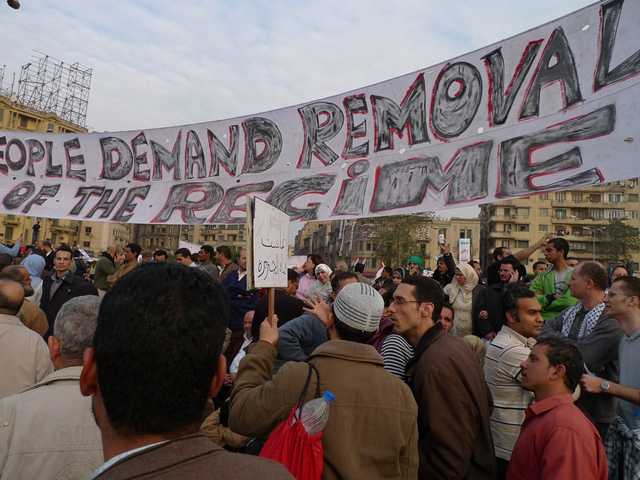Through my Eyes: I’m Syrian and I’m Jealous


A young Syrian journalist describes what he feels and thinks when watching the revolution in the Arab world these days
By Abdulsalam Muen
March 15, 2011 I finally understand what revolution really means: people believe in themselves, and thus they make it happen. A real revolution is nothing like what we were taught about in our school books. No military coups, no revenge, no political bloodshed in the name of the revolution.
Tunis first, then Egypt. I watched how young men and women declared their refusal of the reality that had been forced on them, how they showed that they cared about their own future. I couldn’t drag myself away from the TV screen, except when the electricity gave out. The freedom that surged in their chanting made me cry. My heart longed for a Syrian revolution that would one day be written in history books for the next generation to read about. I wished we could finally put away this dark chapter of the Syrian people’s suffering and deprivation.
The Syrians are not only interested in what’s happening, they’re involved, maybe even worried, especially the youth. University students, customers in coffee shops, malls and restaurants, everybody is suddenly a reporter, an analyst and maybe even a pseudo-rebel. They try to analyse their thought as they express their opinions, and sometimes go as far as making suggestions that they wish the Egyptians and Tunisians could hear.
Even while walking in the street, I, like many others, peep inside shops and cafes every so often to steal a look at their TV sets and figure out what’s new. No-one can bear to miss a detail. Yet we have more than just a passive role of watching news broadcasts. Something concrete has started to reflect a new wave of change in Syria, even if only in hesitant ways.
New groups on Facebook have started to emerge, petitions for change or reforms have been written, there have been peaceful protests here and there in support of the Arab revolutions, where demonstrators also chanted for themselves, “Freedom, Freedom!” For the first time in decades, Syrians are saying what they really think of their situation. They’re allowing themselves, now, to be angry – publicly – while also raising questions around the possibility of change.
I would’ve never imagined that my friend in university, who happens to be a member of one of the Progressive National Front political parties, controlled by the regime, would express a desire to hit the streets demanding change. Only a few months ago, he told me that not only did he not care enough to want to make changes, but that he was actually content with the way things were and that there was no other or better way to be. But now he feels differently.
People are worried. The authorities are concerned too. Graffiti has started to appear on walls in the streets and in different rural areas around Damascus. Some slogans demanded the overthrow of the Syrian president, although the Security forces quickly made use of paint buckets to cover up that particular graffiti wherever they found it. It seems the regime hasn’t figured out yet the best way to deal with the news coming from Tunis and Egypt, let alone how to handle the local movements. It’s clear that the security apparatus is on stand-by. However, one can see that the Syrian regime has failed to learn the lesson that cost its Tunisian and Egyptian counterparts so much.
On the media level, for example, Syrian TV chose to ignore what was going on at the beginning of the revolutions, and when it could no longer do so it became selective and picked out some very peculiar editorial angles. So, that’s how Mubarak’s stepping down became “the fall of the Camp David regime”, rather than the end of a dictatorship that repressed and humiliated its people. But what’s worse is the president’s new popular political campaign.
His participation in the festivities of Prophet Mohammed’s birth, two weeks ago, was broadcast live on Syrian TV from the Umayyad mosque in Damascus. The crowds were shown chanting for him and kissing his hands, with many street billboards displaying slogans such as, “We’d burn ourselves and our children for Bashar Assad.”
Weirdly enough, this slogan is supposed to be reminiscent of the young man’s self-immolation that triggered the revolution in Tunis. I can tell, from the people’s reactions around me, that this kind of propaganda, especially now, is infuriating the Syrians. People say that the regime would rather try to sugar-coat its continuing oppression, than to demonstrate an honest will for change that would improve people’s lives, both politically and economically.
Our generation is boiling, there’s no doubt about that. Yet young people are still asking a difficult question that remains unanswered: how and where should we start? That’s a tricky one. We want a Syria for everyone. We want freedom, democracy and justice. It hurts badly that so far the ship of the revolution has been sailing on without us. Our pride and dignity is wounded. But we must not despair.
After Tunis, Egypt and Libya, nothing seems impossible anymore. Maybe just believing in that could be the first step.
